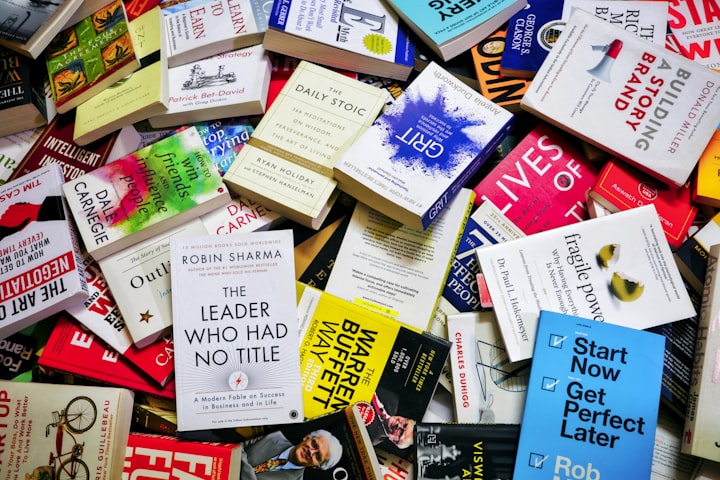Self-Help Gurus Don't Help Anyone
No, they don't even help you help yourself.

Self-help gurus have really caught my attention lately. While the self-help genre has been popular for a long time already, recent events have led to people seeking out self-reflection, their true purpose, or just motivational content after we’ve all been isolated, and some of us have been given the chance to pursue our dreams like we never have before. We could all use some feel-good positivity. But self-help gurus are not the way to go. In fact, I’d argue that they don’t really help anybody, at least, not in any real tangible way. Besides, many of them aren’t qualified to be giving any sort of advice at all. Let’s explore why, shall we?
First, self-help gurus are essentially glorified salesmen, but the things they are selling, above all else, are abstract concepts and ideas. In theory, that’s harmless, right? If someone wants to pay them to listen to them talk, no harm done? The problem is, these ideas come with the theme that your life sucks, and if you just follow what they say, it will get better. But if your life doesn’t get better, that’s your fault. This leads to self-blame and anxiety and is sort of gaslighting in a way. Yes, to an extent, people have responsibility over their own lives and some agency to change. But self-help gurus don’t give any tangible advice to actually help someone change, other than “mindset” and positive thinking. The question I wonder is, how is mindset going to help a single mom working three jobs to support her family? Mindset won’t help her pay her bills or make her more money.
Self-help gurus are the epitome of toxic positivity But wait, how can positivity be toxic? Well, I suppose if you were intrigued enough to read this, you probably already know what it means, but if not, that’s okay. Toxic positivity is the kind of thing that ignores valid issues that someone experiences in favor of encouraging them to just be happy, and tends to convey that working hard is the only thing needed to be successful. Self-help gurus engage in toxic positivity by ignoring systemic issues that prevent people from getting ahead. They often claim that by working hard and believing in yourself, you can be as successful as you want, and if you’re not successful, well, that’s on you. If hard work was all it took, then all single parents, construction workers, nurses, social workers, fast food workers, and other employees in difficult jobs would be millionaires by now.
Sure, some self help gurus did work very hard to get where they are, and so they claim that hard work and a positive attitude is the key to success. The problem is, plenty of people work just as hard as self-help gurus, but they never get that stroke of luck or inherit the money or make the connections needed in order to succeed. Not that everyone should, or can in our current economic model. But gurus act like anyone and everyone can, regardless of multiple societal factors, and they make people feel like it’s their fault they’re in their situation, even if the person is doing what they’re “supposed to” by following the guru, in addition to working as hard as they can just to survive.
Let’s give the example of Rachel Hollis, a somewhat newer self-help guru that was canceled for showing just how out of touch she is once on a Tik Tok livestream. She has reported that she grew up poor, and now she’s rich. However, when she was 19, she married a Disney executive, Dave Hollis. His money was fundamental in helping her establish her self-help business, The Hollis Company. She had the freedom to take a risk and create that company, which most people don’t have. Did she work hard? Absolutely. As much as I don’t like her for some of the things she has said, she is definitely a hard worker and doesn’t give up. However, although she started with good intentions, she has become out of touch lately, as most self-help gurus seem to, and she tries to act like an inspirational know-it-all without having an idea what normal people go through. Some of us interested in the self-help world might be familiar with this Tik Tok live clip. I think Rachel is a good example of that unrelatability that most self-help gurus go through eventually. That being said, plenty of other people are hard workers too, but are simply never able to take the risk needed to try and open a successful business, or they don’t know how, or they’re disabled, or about a million other things. It takes more than a positive mindset to overcome systemic inequality. It’s a fact that someone's gender, race, and even their geographical location affect their ability to succeed in the world. Sure, there are always people who break the mold, but they are the exception, not the rule.
Most gurus act like they are qualified to be giving out advice. This advice often has a real impact on people’s finances, mental health, careers, or marriages. But most of the gurus aren’t qualified whatsoever in those areas. If one wants to seek out real help, there’s a reason why licensed therapists have years of schooling. People who are qualified to actually give real advice learn about not just the human mind, but the reality of systemic issues and how being a certain class, race, gender, or any other identity affects the way you exist in the world. That’s just a fact. Therefore, professionals can give advice that is more tailored to your situation, or even better, guide you towards making tangible strides to your own personal goals by using your own strengths. I’m not saying that anyone giving advice needs to have a degree or be an expert but they should be grounded and know your situation better than a guru giving out general, vague advice to the masses. The advice that self-help gurus give isn’t anything that you don’t know already, but it’s phrased in such a way that makes people feel like it’s insightful. Thus, it can cause people to refrain from seeking real help.
Self help gurus know about the human mind too in a way. They know enough about how to manipulate people into purchasing their courses, books, and conferences. Yes, people have to make money, but if self help gurus genuinely wanted to help people, they wouldn't connect every single thing they do to making a profit. Not that everyone should provide free labor, but teachers are a good example. So are social workers and therapists. Those are people who are actually qualified, make money for what they do, but don't have extra things to sell at every corner. A doctor might get paid well, but a good doctor identifies the problem and helps you solve it without upselling unnecessary treatments. If they did upsell you, you would call them a scammer and greedy.
There’s a reason why self-help is so popular.The advice is very one-size-fits-all. This draws a lot of people in because they feel the advice is pertinent to them, but in actuality, it’s so vague that it doesn’t lead to anything relevant. When people consume that content, it makes them feel happy and motivated. The problem is, self-help is a manipulative trap intended to make people fall into a cycle of buying new books and going to conferences. Self-help leads to a cycle to get you to consume more self-help. It’s instant gratification. You read a book, listen to a tape, whatever. You feel really good and motivated. You change your mindset. But since there was no real, tangible advice, you usually end up staying where you were before. Frustrated with yourself, and wanting motivation, you look for more self-help content to consume. When the hype and motivation dopamine wears off, a person craves more, so they read another self-help book, and then another. They might do some self-reflecting but their situation doesn’t change. Maybe it doesn’t need to, but again, a lot of these books are built on the idea that you can manifest your dreams and if you don’t, it’s your fault.
The way I see it, there are a few ways of becoming rich and successful. One, you could invent something and/or start a business. What do you need for that? Success is about connections, luck, having the right interests, and the ability to be motivated. Mental health and ability play huge roles in all of that.
Here’s an example of how self-help doesn’t take into account all systemic factors that prevent one from getting ahead. One individual that many of you may know is Tony Robbins. He came from a poor background with trauma. He’s theoretically the kind of person I’m saying can’t be successful, right? And to be sure, he worked hard at first. He was first a janitor and stretched that money to get what he wanted. He was motivated, and a hard worker, and he inspired Rachel Hollis, who I talked about earlier. Tony is the exception, not the rule. He does help other people become successful-- those who have the ability to connect with him and afford his services, that is.
Here’s the thing. Many people don’t even have the opportunity to be motivated or take risks because they’re trying so hard just to survive. I know someone who has worked their own business for 20+ years. They are one of the hardest workers I know. In some ways, they have a similar backstory to Tony. They were poor growing up, started working early in life, and most of the time, worked multiple jobs to make ends meet. Even so, they don’t have a retirement fund, and will likely have to work past the standard age of retirement. Does this mean that they should have tried harder? Does this mean their mindset was wrong? I don’t think so. It just means that they didn’t happen to be in the correct circumstances to be successful. If they could, they likely would have gone a different route. In hindsight, they often speak of real estate as a possibility that they wish they had known more about for making money. But they were never educated on how to get involved with that. Maybe they could have gone a different route into a different business, but even if they did, not everyone can be a self-help guru or a CEO or an inventor. If the advice of self-help gurus really did work, we would see an influx of people becoming successful, simply from applying and using their advice.
As I mentioned earlier, on top of being unqualified other than their own experience, self-help gurus don’t give any tangible advice. This is seen most blatantly in their connection to multi-level marketing companies. Many representatives in these MLM companies are often shown presentations or speeches from self-help gurus or network marketing “experts” to motivate them into working harder at their business. MLMs, also known as network marketing, claim to be the way someone can start a business without the risk of a huge investment. However, in reality, MLMs are actually barely-legal in the sense that they are adjacent to a pyramid scheme, the only difference being that the MLM sells a product, while pyramid schemes do not. However, in an MLM, the main way for reps to make money is by recruiting others into a downline. I say all of that, especially showing how MLMs are akin to a pyramid scheme, to make the point that it is very difficult to actually make money with them. However, as I mentioned, the reps are encouraged to go to conferences where self-help gurus like Rachel Hollis speak and tell them that they can do anything to achieve their dreams if they just work hard enough and believe it to be true, when statistically, that’s false, and that is proven to be so by the company’s own statistics. Often, the reps are told that these things will help them in their business, but the advice from the self-help gurus or network marketing experts is extremely vague.
I bring this up not only to give an example of how self-help guru advice is not remotely useful, but because our capitalist model works in a similar way to MLMs. There are a few people at the very top who make the most money, and significantly more at that. Then, the people at the bottom struggle more and more until we get to the bottom where a great number make almost nothing or even lose money. However, the only difference between capitalism and a normal corporation compared to an MLM is that at least the people at the bottom in a corporation are guaranteed a paycheck. I talk more about this in another article I’ve written about multi-level marketing.
Going back to my main point. Self-help gurus give inspirational, if ultimately useless advice to the everyday person as they do to MLM reps. They don’t give any tangible advice for how to actually succeed in business, etc. All or most of the advice is abstract platitudes that ultimately mean nothing. What reps need is advice on how to sell their products consistently (or recruit people, thus falling into the sketchy pyramid scheme side of things). Self-help gurus also target people who are entrepreneurs. It would be very helpful for them to share step-by-step how to make those connections, apply for a loan, ya know, specific steps. Instead, they sell books over and over again that essentially boil down to, “you can do it!” and “if you’re depressed, that’s your fault because of your mindset” with lots of cliffhangers that lead to click holes that lead to someone spending more money on their products.
This article might sound like a long, petty monologue about how much I hate the self-help industry, and maybe it is. I don’t intend it to be. To be honest, I don’t have much against self-help gurus personally. However, what I do dislike is those who are privileged taking advantage of those who are not by essentially scamming them by giving them useless information that makes them feel temporarily good and productive, but ultimately doesn’t help them at all. If you like self-help, and feel like it genuinely helps you, then I’m honestly happy for you. I just hope that those who engage in those products and services can reflect on what their money is being spent on, and if they are actually being helped. In conclusion, my opinion is that self-help gurus don’t help anyone, because they are unqualified, unrealistic, scammy salesmen that don’t address issues that prevent people from getting ahead.
I would love to know your thoughts, even if you disagree. If you found this informative or educational, feel free to give me a follow. Thanks for reading!
About the Creator
Jessica Mann
I appreciate the complexities and nuances of life, and see nothing as black and white. Social issues and mental health fascinate me, as I live with depression and ADHD. I have a bachelor's degree in sociology, and could study it forever.






Comments
There are no comments for this story
Be the first to respond and start the conversation.